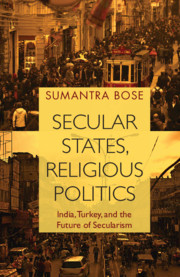Book contents
6 - Secular and Anti-Secular Authoritarianisms
Published online by Cambridge University Press: 20 October 2018
Summary
We are openly nationalist. Nationalism is the only cause that keeps us together. Except for the Turkish majority, none of the other elements shall have any impact. We shall, at any price, turkicize those who live in our country, and destroy those who rise up against the Turks and Turkdom.
—Ismet Inonu, the first Prime Minister (1923–37) and Mustafa Kemal's successor as the second President (1938–50) of the Republic of Turkey, speaking in 1925The non-Hindu people of Hindustan must either adopt the Hindu culture and language [sic], must learn and respect and hold in reverence the Hindu religion, must entertain no idea but the glorification of the Hindu race [sic] … or [they] may stay in the country, wholly subordinated to the Hindu nation, claiming nothing, deserving no privileges, far less any preferential treatment.
—Madhav Sadashiv Golwalkar, sarsanghchalak (supreme chief) of the Rashtriya Swayamsevak Sangh (RSS) from 1940 to 1973, writing in the late 1930sThe rhetorics of Ismet Inonu and M. S. Golwalkar are strikingly – and chillingly – similar. Inonu (1884–1973) was, of course, one of the founding leaders of the Turkish secular state. A key lieutenant of Mustafa Kemal, he served as chief of staff of the Turkish Armed Forces in 1920–21 and was referred to as milli sef, or national chief, during his long tenure as President of the Turkish Republic (Kemal was referred to after his death as the ebedi sef, or eternal chief, among other honorifics). Inonu returned as Turkey's Prime Minister later in life, from late 1961 to early 1965, to lead three shortlived coalition governments after Turkey's first military coup in 1960. He headed the Republican People's Party (CHP), the staunchly secularist party born of Kemal's politics and associated with the eternal chief's legacy, from the time of Kemal's death in late 1938 until 1972, shortly before his own death in 1973.
Unlike Ismet Inonu, Madhav Sadashiv Golwalkar never wielded state power. He was a dissident in India's secular state. But although far removed from state power, Golwalkar's political importance can hardly be overstated. He is probably the single most important figure of the Hindu nationalist movement, and the most influential voice of its creed of anti-secularism, since the movement's inception in the 1920s.
- Type
- Chapter
- Information
- Secular States, Religious PoliticsIndia, Turkey, and the Future of Secularism, pp. 216 - 295Publisher: Cambridge University PressPrint publication year: 2018



